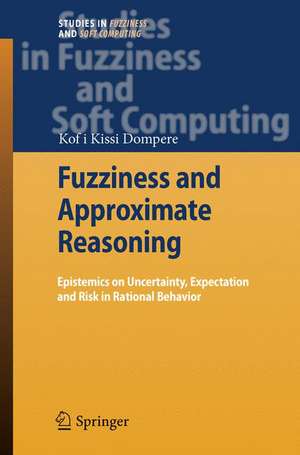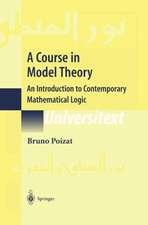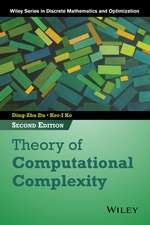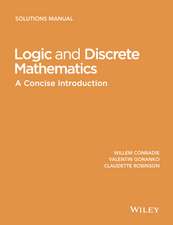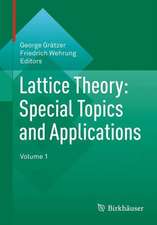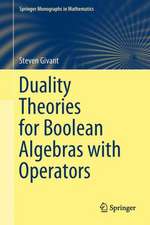Fuzziness and Approximate Reasoning: Epistemics on Uncertainty, Expectation and Risk in Rational Behavior: Studies in Fuzziness and Soft Computing, cartea 237
Autor Kofi Kissi Dompereen Limba Engleză Hardback – 26 mar 2009
| Toate formatele și edițiile | Preț | Express |
|---|---|---|
| Paperback (1) | 641.38 lei 6-8 săpt. | |
| Springer Berlin, Heidelberg – 21 oct 2010 | 641.38 lei 6-8 săpt. | |
| Hardback (1) | 647.59 lei 6-8 săpt. | |
| Springer Berlin, Heidelberg – 26 mar 2009 | 647.59 lei 6-8 săpt. |
Din seria Studies in Fuzziness and Soft Computing
- 20%
 Preț: 999.85 lei
Preț: 999.85 lei - 20%
 Preț: 653.06 lei
Preț: 653.06 lei - 20%
 Preț: 872.98 lei
Preț: 872.98 lei - 20%
 Preț: 930.57 lei
Preț: 930.57 lei - 20%
 Preț: 1051.00 lei
Preț: 1051.00 lei - 20%
 Preț: 992.44 lei
Preț: 992.44 lei - 20%
 Preț: 655.85 lei
Preț: 655.85 lei - 20%
 Preț: 1001.86 lei
Preț: 1001.86 lei - 18%
 Preț: 954.14 lei
Preț: 954.14 lei - 20%
 Preț: 330.10 lei
Preț: 330.10 lei - 20%
 Preț: 333.04 lei
Preț: 333.04 lei - 20%
 Preț: 997.56 lei
Preț: 997.56 lei -
 Preț: 391.61 lei
Preț: 391.61 lei - 20%
 Preț: 647.79 lei
Preț: 647.79 lei - 20%
 Preț: 986.01 lei
Preț: 986.01 lei - 18%
 Preț: 958.56 lei
Preț: 958.56 lei - 20%
 Preț: 996.40 lei
Preț: 996.40 lei - 20%
 Preț: 999.35 lei
Preț: 999.35 lei - 15%
 Preț: 646.43 lei
Preț: 646.43 lei - 20%
 Preț: 651.57 lei
Preț: 651.57 lei - 20%
 Preț: 997.89 lei
Preț: 997.89 lei - 15%
 Preț: 641.03 lei
Preț: 641.03 lei - 20%
 Preț: 1009.74 lei
Preț: 1009.74 lei - 20%
 Preț: 992.62 lei
Preț: 992.62 lei -
 Preț: 388.72 lei
Preț: 388.72 lei - 18%
 Preț: 1223.43 lei
Preț: 1223.43 lei - 20%
 Preț: 651.42 lei
Preț: 651.42 lei - 18%
 Preț: 951.59 lei
Preț: 951.59 lei - 18%
 Preț: 948.61 lei
Preț: 948.61 lei
Preț: 647.59 lei
Preț vechi: 761.87 lei
-15% Nou
Puncte Express: 971
Preț estimativ în valută:
123.93€ • 128.91$ • 102.31£
123.93€ • 128.91$ • 102.31£
Carte tipărită la comandă
Livrare economică 14-28 aprilie
Preluare comenzi: 021 569.72.76
Specificații
ISBN-13: 9783540880868
ISBN-10: 3540880860
Pagini: 316
Ilustrații: XXIV, 289 p.
Dimensiuni: 155 x 235 x 28 mm
Greutate: 0.62 kg
Ediția:2009
Editura: Springer Berlin, Heidelberg
Colecția Springer
Seria Studies in Fuzziness and Soft Computing
Locul publicării:Berlin, Heidelberg, Germany
ISBN-10: 3540880860
Pagini: 316
Ilustrații: XXIV, 289 p.
Dimensiuni: 155 x 235 x 28 mm
Greutate: 0.62 kg
Ediția:2009
Editura: Springer Berlin, Heidelberg
Colecția Springer
Seria Studies in Fuzziness and Soft Computing
Locul publicării:Berlin, Heidelberg, Germany
Public țintă
ResearchCuprins
Fuzzy Rationality, Uncertainty and Expectations.- Fuzzy Rationality and Classical Sub-optimal Rationality.- Fuzzy Rationality, Ambiguity and Risk in Decision-Choice Process.- Epistemics of Risk and Optimal Decision-Choice Rationality.- Reflections on Some Decision-Choice Theories on Uncertainty and Risk.- Fuzzy Decision-Choice Rationality and Paradoxes in Decision-Choice Theories.
Textul de pe ultima copertă
This monograph is special in its orientation and contribution to current state of our understanding of decision-choice process and knowledge production. Its special orientation is to bring to the scientific community the discussions on the epistemic structure of the relationships among uncertainty, expectations, risk, possibility, probability and how the rules of fuzzy paradigm and the methods of fuzzy rationality bring new and different understanding to the relationships. At the level of theory of knowledge, it presents the structure and epistemic analysis of uncertainty, expectations and risk in decision-choice actions through the characteristics of substitution-transformation and input-output processes in categorial dynamics of actual-potential duality. The interactive effects of rationality and expectation are examined around belief, prospect, time and conditions of belief justification where the relationship between possibility and probability as a sequential link between potential and actual is analyzed to provide some understanding of the role of relative costs and benefits in defining risk in both nature and society. The concepts of possibilistic and probabilistic beliefs are explicated in relation to rationality and the decision-choice process where the analytical relationship between uncertainty and expectation formation is presented leading to the introduction of two types of uncertainty composed of fuzzy uncertainty and stochastic uncertainty.
Caracteristici
Develops an epistemic framework for understanding fuzzy paradigm and fuzzy optimal decision-choice rationality Focuses on unified epistemic models of decision-choice processes
